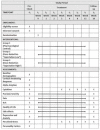Expectation-induced enhancement of pain, itch and quality of life in psoriasis patients: study protocol of a randomised controlled trial
- PMID: 34475155
- PMCID: PMC8413966
- DOI: 10.1136/bmjopen-2020-047099
Expectation-induced enhancement of pain, itch and quality of life in psoriasis patients: study protocol of a randomised controlled trial
Abstract
Introduction: Experimental and clinical data demonstrate that skin diseases like psoriasis are affected by psychological factors and can be modulated by interventions other than conventional drug therapy. The expectation of patients towards the benefit of a forthcoming treatment as well as treatment pre-experiences have been demonstrated as crucial factors mediating placebo responses in inflammatory skin diseases. However, it is unknown whether and to what extent treatment outcomes of psoriasis patients under therapy with monoclonal antibodies like secukinumab can be experimentally modulated at subjective and physiological levels by modifying the expectation of patients via verbal instruction or prior experience.
Methods and analysis: Treatment expectations will be modulated in patients with moderate-to-severe psoriasis undergoing treatment with the anti-interleukin-17A monoclonal antibody secukinumab. Patients with a Psoriasis Area and Severity Index (PASI) >12 will be randomly allocated to one of three groups (N=40 each). As a standard schedule, patients in the pharmacological control group (group 1) will be treated weekly with 300 mg secukinumab, while patients in groups 2 and 3 will receive only 75 mg secukinumab (75% dose reduction) during all treatment weeks. In addition to the injections, patients in group 3 will ingest a novel tasting drink, with a cover story explaining that previous studies showed additional beneficial effects of this combination (drug and drink). Patients will be assessed and treated at nine visits over a 16-week period, during which the severity of pain and itch symptoms, skin lesions and quality of life will be analysed with standardised questionnaires and the PASI.
Ethics and dissemination: This study was approved by the Ethics committee of the Medical Faculty of the University Duisburg-Essen. Study outcomes will be published in peer-reviewed scientific journals.
Keywords: dermatology; immunology; neurobiology; psoriasis.
© Author(s) (or their employer(s)) 2021. Re-use permitted under CC BY-NC. No commercial re-use. See rights and permissions. Published by BMJ.
Conflict of interest statement
Competing interests: WS reports grants from medi Bayreuth, personal fees from Janssen, grants and personal fees from Novartis, personal fees from Lilly UCB, Almirall, LEO Pharma and Sanofi Genzyme, outside the submitted work. The other authors declare that they have no competing interests.
Figures
Similar articles
-
Systemic pharmacological treatments for chronic plaque psoriasis: a network meta-analysis.Cochrane Database Syst Rev. 2017 Dec 22;12(12):CD011535. doi: 10.1002/14651858.CD011535.pub2. Cochrane Database Syst Rev. 2017. Update in: Cochrane Database Syst Rev. 2020 Jan 9;1:CD011535. doi: 10.1002/14651858.CD011535.pub3. PMID: 29271481 Free PMC article. Updated. Review.
-
Secukinumab dosing every 2 weeks demonstrated superior efficacy compared with dosing every 4 weeks in patients with psoriasis weighing 90 kg or more: results of a randomized controlled trial.Br J Dermatol. 2022 Jun;186(6):942-954. doi: 10.1111/bjd.20971. Epub 2022 Apr 8. Br J Dermatol. 2022. PMID: 34981829 Clinical Trial.
-
Guselkumab versus secukinumab for the treatment of moderate-to-severe psoriasis (ECLIPSE): results from a phase 3, randomised controlled trial.Lancet. 2019 Sep 7;394(10201):831-839. doi: 10.1016/S0140-6736(19)31773-8. Epub 2019 Aug 8. Lancet. 2019. PMID: 31402114 Clinical Trial.
-
Secukinumab is superior to ustekinumab in clearing skin of subjects with moderate to severe plaque psoriasis: CLEAR, a randomized controlled trial.J Am Acad Dermatol. 2015 Sep;73(3):400-9. doi: 10.1016/j.jaad.2015.05.013. Epub 2015 Jun 17. J Am Acad Dermatol. 2015. PMID: 26092291 Clinical Trial.
-
Etanercept and efalizumab for the treatment of psoriasis: a systematic review.Health Technol Assess. 2006 Nov;10(46):1-233, i-iv. doi: 10.3310/hta10460. Health Technol Assess. 2006. PMID: 17083854 Review.
Cited by
-
Systemic pharmacological treatments for chronic plaque psoriasis: a network meta-analysis.Cochrane Database Syst Rev. 2023 Jul 12;7(7):CD011535. doi: 10.1002/14651858.CD011535.pub6. Cochrane Database Syst Rev. 2023. PMID: 37436070 Free PMC article. Review.
-
Secukinumab Loss of Efficacy Is Perfectly Counteracted by the Introduction of Combination Therapy (Rescue Therapy): Data from a Multicenter Real-Life Study in a Cohort of Italian Psoriatic Patients That Avoided Secukinumab Switching.Pharmaceuticals (Basel). 2022 Jan 14;15(1):95. doi: 10.3390/ph15010095. Pharmaceuticals (Basel). 2022. PMID: 35056153 Free PMC article.
-
"I Was Almost in Disbelief" - Qualitative Analysis of Experiences and Expectations Among Psoriasis Patients Undergoing Biologic Treatment with Secukinumab.Patient Prefer Adherence. 2024 Jun 24;18:1299-1310. doi: 10.2147/PPA.S458643. eCollection 2024. Patient Prefer Adherence. 2024. PMID: 38947870 Free PMC article.
-
Systemic pharmacological treatments for chronic plaque psoriasis: a network meta-analysis.Cochrane Database Syst Rev. 2022 May 23;5(5):CD011535. doi: 10.1002/14651858.CD011535.pub5. Cochrane Database Syst Rev. 2022. Update in: Cochrane Database Syst Rev. 2023 Jul 12;7:CD011535. doi: 10.1002/14651858.CD011535.pub6. PMID: 35603936 Free PMC article. Updated. Review.
References
Publication types
MeSH terms
LinkOut - more resources
Full Text Sources
Medical
Research Materials

